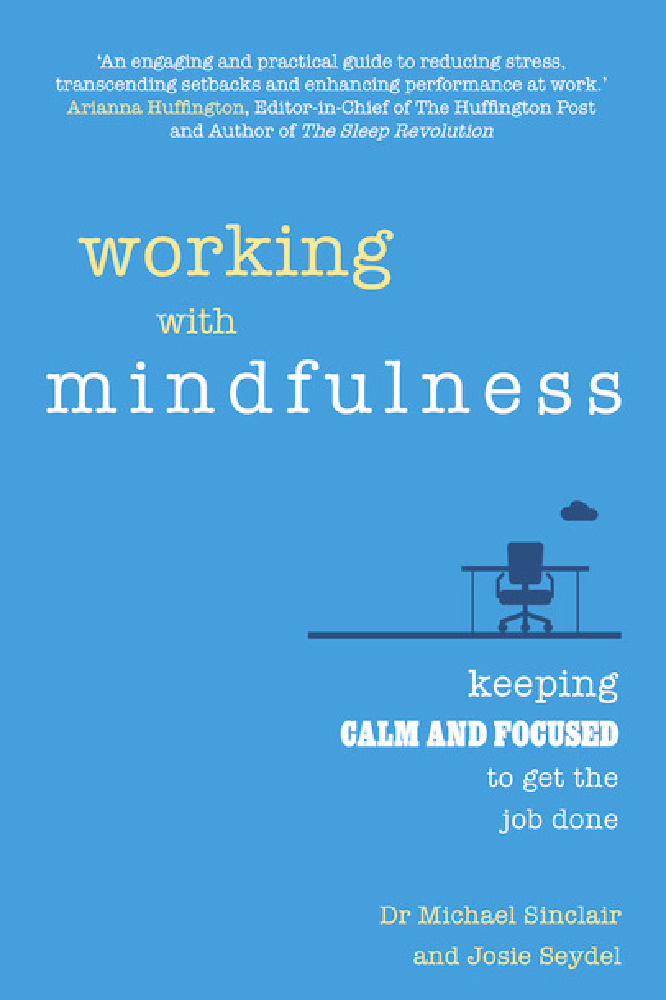After an altercation with the big cheese do you find yourself feeling glum and eating all the staff biscuits again? Or are you fuming and plotting a vengeful crime? Swinging from rage to despondency may feel all too familiar if your boss is behaving like an arse (again); hierarchical conflicts can be immensely disempowering because our difficult emotions are often stifled and supressed in the recognition that if we actually let rip with our true feelings we would likely lose our precious job and cause permanent traumatic shock to our colleagues. So what alternatives do we have to either 'putting-up and shutting -up' or 'going green golem'? Well, we are about to offer you a short workout, to stay calm, regain your composure and discover a little more harmony, at least on the inside. The following exercise is based on mindfulness techniques, and adapted from our new book ( Working with Mindfulness) which is packed with loads more information and practical tips to help you get the best out of yourself, your team and your boss, at work.

Working with Mindfulness
Mindfulness requires no previous knowledge, skills or 'spiritual' qualities, but if you have any of these already that's also fine. Mindfulness is conceptually very straight-forward; it is simply the practice of present-focussed awareness. This practicing (usually through various exercises) means learning to become aware of habitual thoughts and behaviours through observing how our mind tends to be reactive and distracted. A mind which is operating by habit and reactivity tends to lead to feelings of loss of control and anxiety in life and results in poor decision-making and haphazard behaviours. Using greater mindfulness we develop acceptance, patience and curiosity and we can learn to let go of our reactivity so that we can then consciously take charge of our lives, reducing our levels of stress and increasing our sense of calm, confidence and competency.
The following exercise will help you to start to get a grip on any challenging thoughts and feelings which may occur when the boss has pissed you off. From here you can then then move on to finding ways to effectively communicate your thoughts and feelings, should you still wish to, with a far greater chance of efficacy, as they will now be conscious and considered responses rather than knee-jerk reactions. You can try this exercise anytime you like, but it will be especially valuable following any conflict:
- Back away from any confrontation for now. Take yourself somewhere you can be alone for a short while - go for a walk or even hang out in the toilet cubicle if you must!
- Take a moment just to have a deep, slow breath or two to help regulate your nervous system (but don't worry about 'having to be calm')
- Now, notice your feet in contact with the floor. Feel the sense of solidity of the ground or floor beneath you. Become aware of any sensations in the feet (heat, pressure, tension, etc.).
- Be aware of your legs, your pelvic area, your torso, your arms, your chest area and then your head. As you notice your head become aware of exactly where you first notice the breath entering the body.
- If you find that your mind is reeling back to replaying the altercation or incident, or winding forward to rehearsing all the witty/cutting/honest responses you could make, then just notice this and - rather like training an errant puppy - bring your mind back to focussing on the breath.
- Notice the air entering your body, expanding into the lungs and then how the lungs naturally turn the breath, and begin to ease and contract as the breath now leaves the body. Just for now, let yourself be captivated by this mini-miracle of breathing for a few minutes.
- Next, even though it may feel difficult to do (and we're not suggesting that you have to like or hug your boss) try recognising that s/he struggles with challenging thoughts and difficult feelings just like you; s/she suffers from time to time and will get ill and die just like you; everyone s/he knows also suffers and will get ill and die just like you. Life is hard for all humans and recognition of this can give rise to greater compassion. Maybe try repeating 'may you feel ease, peace, etc.' both wishing this for yourself and your boss. Noticing the humanity in you, that also resides in your boss, may lessen your anger/stress levels and reactivity and can give rise to a little softening in a hard situation.
- Just for these few minutes you have encouraged yourself not to spin off into reactivity, or to increase your sense of hurt or injustice through replaying events. Neither have you berated yourself, blamed anyone, or made the situation worse. You may even have generated a little compassion. In fact, just spending a few moments breathing mindfully like this you've made great steps towards finding genuine calm and regaining control.


Dr Michael Sinclair and Josie Seydel are the authors of Working with Mindfulness . It is out now, published by Pearson, priced £13.99

